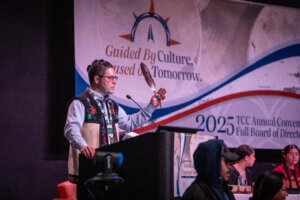 The theme of the 2025 Tanana Chiefs Conference Annual Convention, “Guided by Culture, Focused on Tomorrow,” resonated powerfully during this year’s keynote address.
The theme of the 2025 Tanana Chiefs Conference Annual Convention, “Guided by Culture, Focused on Tomorrow,” resonated powerfully during this year’s keynote address.
The speech was delivered by Taa’ąįį Ch’igiiontà of Arctic Village, along with his daughters, Na’ni’eezh and Ch’eelil, and First Traditional Chief Trimble Gilbert. Much of the address was spoken in Dinjii Zhuh K’yàa, the Gwich’in language, and translated on stage into English. The speakers emphasized the strength of Indigenous identity, the urgency of language preservation and the shared responsibility we all have to carry these values into the future.
Taa’ąįį, a Neets’aii Gwich’in leader and advocate for Indigenous languages and rights, focused on healing through language and living in alignment with ancestral values.
“We need to teach the young how to be Native people,” he said through his daughters, who have been studying Gwich’in for two years. “It is good to make time to learn how to survive from the land — to hunt and harvest, to tan hides and sew our own clothing.”
Their family’s commitment to cultural preservation was clear in both words and example. Ch’eelil shared her experience of living in Arctic Village and learning to live from the land — hunting caribou, drying meat and finding peace in those practices. Na’ni’eezh reflected on how learning to speak the language, sing, bead and sew has grounded her identity and renewed her spirit.
“Learning who we are is healing,” Na’ni’eezh said. “When we live our ways of life, we heal and respect all our relations.”
Gilbert, who has lived traditionally in Arctic Village for more than 75 years, shared reflections on the enduring strength of Gwich’in communities.
“For thousands of years, we’ve been taking care of each other,” Gilbert said. “And I’m so happy that we still take care of each other.”
He spoke about Elders who only spoke Gwich’in, communities sustained by Native foods, and the importance of continuing cultural practices through song, dance and storytelling.
The keynote concluded with traditional songs, including one written after the historic 1915 gathering of Alaska Native leaders, and the Caribou Skin Hut Song, composed by Louie Silas Williams of Tanana. As people gathered to drum and sing, the moment became both a tribute to the past and a declaration of unity and strength.
At a time when Indigenous languages face rapid loss and traditional food systems are under threat, the keynote served as a call to action.
“Now is the time,” Taa’ąįį said. “While we still have knowledgeable Elders in our communities.”
He went on to speak about the importance of unity and healing as essential steps toward moving forward.
“For us to work together — we need to heal together,” he said. “Our parents and grandparents were told not to speak our language and to be who they were as Native people. This caused a lot of pain and confusion. Now we have to recover from this hurt and become strong people, as our ancestors were long ago.
“As Native people, we know it is right for us to be who we are. It is good to speak with an Indigenous mindset. Learning our language is healing. Learning the skills and knowledge from our ancestors is healing. Learning who we are is healing.
“As we heal, let us learn to forgive ourselves and others. A single arrow can be easily broken. However, a bundle of arrows is unbreakable.”
Their voices — carrying the strength of generations — served as a reminder that when people are rooted in language, culture and community, the knowledge and spirit of their ancestors live on.
Watch the full keynote address here: https://www.youtube.com/watch?v=ZUIzeeF3YU8
